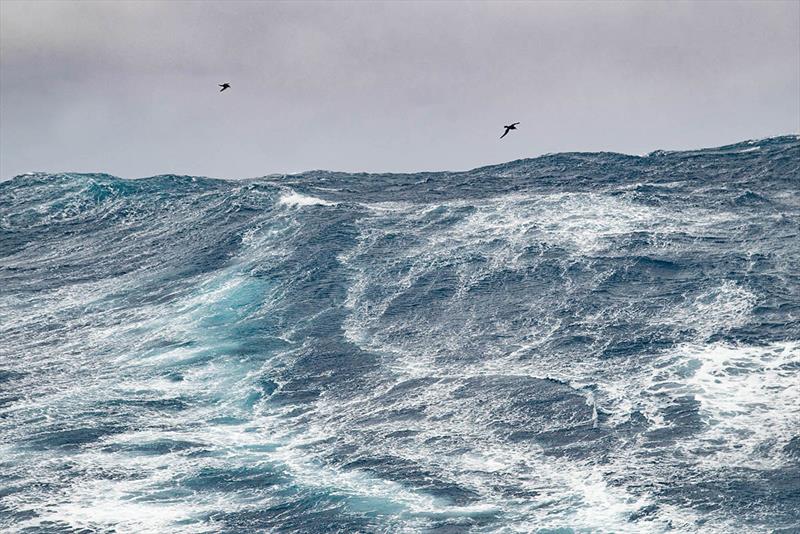
Celebrating Marvin Creamer's uniquely ambitious circumnavigation
by David Schmidt 25 Aug 2020 15:00 UTC
August 25, 2020

Big rollers on the Southern Ocean Leg from Cape Town to Fremantle © Clipper Race
I've spent large parcels of the last several weeks writing about the Maxi Yacht Rolex Cup (August 30-September 4) for a different publication, and one of the most impressive things that I learned was exactly how close navigators and tacticians take these massive yachts to the bricks as they compete in the regatta's coastal racecourses. This event—for those who might not know—is limited to yachts that are at least 60 feet, LOA, and up. And this, of course, translates to impressively deep-draught keels and boatspeeds that are easily measured in the low-to-mid teens for uphill work and low-to-mid 20s for downhill sailing, provided, of course, that the weather gods cooperate.
While these metrics are impressive, what put my jaw on my desk was the fact that the best teams often sail these seafloor-scratching keels mere feet above rocks that could wreck absolute havoc if contact is made.
Granted, these yachts are crewed by some of the world's best big-boat sailors, but when the accuracy of one's GPS information is called into question before an afterguard commits to a particular routing, you know that you're playing for keeps in a regatta setting.
It was with these stories in my recent memory that I read The New York Times's (www.nytimes.com/2020/08/17/sports/sailing/marvin-creamer-a-mariner-who-sailed-like-the-ancients-dies-at-104.html) excellent obituary on Marvin Creamer (1916-2020), a geographer, university professor and lifelong sailor who earned international admiration and respect in 1984 when he and a small crew sailed Globe Star, a 36-foot sloop, around the world, sans any navigational instruments.
You read that right: a circumnavigation without even so much as a compass or a watch for guidance or dead-reckoning assistance.
(N.B., to be fair, Creamer and company kept a compass, clock, radio and a sextant aboard, sealed in a locker, in case of an absolute emergency; this scheme allowed them to later prove that they did not rely on any instrumentation on their lap of our lonely planet. In this same light, Creamer also kept an hour glass on hand, which was only used to maintain the crew's watch-keeping schedule.)
All told, Creamer and his crew managed to sail Globe Star some 30,000 nautical miles using only their senses and their knowledge of the earth as guidance.
If this sounds reminiscent of the famous South Pacific wave pilots, you're on the right track.
According to Margalit Fox, who penned Creamer's obituary in The New York Times, Creamer and company trusted "nothing more than wind, waves, the sun by day, and the moon and stars by night." Additionally, Fox wrote that Creamer could determine his position based on water temperature and color, humidity levels, and the presence of certain fauna species when the skies were obscured by clouds.
Yet unlike foolhardy circumnavigations attempted by woefully unprepared "mariners" (I use the term lightly) such as Donald Crowhurst, Creamer spent his life preparing for his around-the-world journey. This included a childhood obsession with star-gazing and ancient forms of navigation, many university-level classes in geography and oceanography, a lifetime passion for offshore sailing, and a series of transatlantic crossings that were made sans all instrumentation.
Despite these significant preparations and previous trials, Fox reports that the world effectively scoffed at his plans when he announced his intentions.
Yet Creamer boldly brushed aside this criticism and, on December 21, 1982, he and his crew set out on what would prove to be a 513-day journey that began and ended on the waters just off of Cape May, New Jersey.
Plenty of adventures ensued, including a temporary detention in the Falkland Islands (remember this was in 1983), some serious partying in Hobart, Tasmania, and a rather unique journey around Cape Horn, not to mention close calls with storms, passing ships and marine life, but, throughout the length of their 30,000 nautical mile voyage, Creamer never doubted his abilities.
The Globe Star crew returned home to a rightly deserved heroes' welcome and much international attention, and Creamer was awarded the Cruising Club of America's prestigious Bluewater Medal.
Most importantly, Creamer proved to himself that his dream of becoming the first sailor to circumnavigate the planet without any navigational tools wasn't a suicide mission.
I'll admit to smiling at the last lines of Fox's obituary, where she notes that Creamer sailed well into his tenth decade on this planet. Ironically, his final sailboat was equipped with a GPS, but the not-so-ancient mariner never bothered to learn how to use it.
It's not like he needed it.
My one regret after reading this obituary of a life truly well-lived is that I had not heard of Mr. Creamer during his living years, nor did I have a chance to interview a truly masterful navigator and sailor. This, of course, reflects only my own ignorance, and I will raise my next glass in his honor and to his audaciously bold theory of navigation.
While it's likely a good thing that he stayed away from the kind of rock hopping that will be unfurling at the Maxi Yacht Rolex Cup, the sailing world is undoubtedly richer for Mr. Creamer's circumnavigation, and for his lifetime of preparation that enabled him to put paid to a truly proud childhood dream.
May the four winds blow you safely home.
David Schmidt
Sail-World.com North American Editor